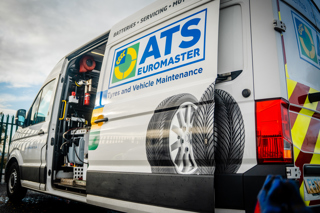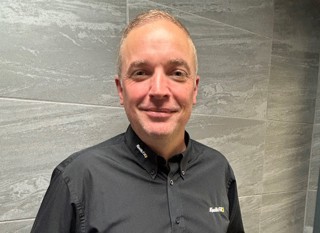Tyres are easily overlooked – by drivers and fleets.
Few drivers check them on a regular basis, even if required by their company policy, yet four patches of rubber no bigger than your hand are all that connects the vehicle to the road.
And that’s not the half of it: tyre management is a minefield of myriad sizes and developing technology with added complexity thrown into the mix from the growth in electric vehicles.
No wonder many fleets offload responsibility to a third party. This is where Kwik Fit steps in.
The 2023 Fleet News Awards supplier of the year has a long and proud heritage in tyre management in the fleet sector. While the company has evolved substantially over the years and now offers full servicing, MOT and mobile repairs alongside exhausts, brakes and batteries, tyres remain the backbone of its business.
As part of the Itochu Corporation, Kwik Fit is at the centre of a virtuous rubber circle with sister companies comprising tyre wholesaler Stapletons, including its 70-site Tyre Pros outlets and 29 Central Tyre truck/agricultural tyre sites, and tyre recycling and repurposing business Murfitts.
Within its value chain proposition, Itochu now sources, stocks, wholesales, despatches, retails, fits and recycles tyres for all vehicle types with each part of the chain enhancing the others.
The business numbers for Kwik Fit are impressive: 697 centres, with almost two-thirds open 8am to 8pm, 185 mobile vans working 30,000 hours in a month, 1.4 million tyres in stock, averaging 900 per centre.
In addition, 13 of the top 20 FN50 leasing companies, with a combined fleet of 1.3 million vehicles, are customers, resulting in 1.1 million authorisations a year.
Now consider the nature of fast fit, based around the while-you-wait concept of turning up without an appointment and getting seen within a couple of hours or so.
And pair that with the fact that Kwik Fit manages 15,000 stock lines, double the number from just three years ago: 100 tyre sizes used to cover 90% of the market; today those 100 sizes cover 70% of the market – the remaining 30% consists of 2,000 sizes!
Ensuring it has the right tyre at the right location at the right time is akin to sorcery.
The expanded choice has been driven by electric vehicles, with their specialist tyres, but also the trend towards wider tyres, more rim sizes, lower profiles and the technology itself.
Then there is demand: Kwik Fit has seen an increase in out-of-traditional-hours requests, especially during and post Covid. Evening and Sunday business has flourished, while mobile now accounts for 20% of fleet work - a rise of 10%.
Video
Investing in IT systems
Kwik Fit has been able to cope with the demand pressures by investing heavily in its IT and back-office systems, explains Dan Joyce, Kwik Fit fleet director.
“Last April we transformed how our business operates through Project Aurora,” he says. “Our mobile software is now cloud-based which allows a more dynamic dispatch of service. It’s like having a final mile solution for tyre fitting.”
When a customer visits the website and places their request, the software looks at stock availability across the mobile network and matches the van to their location and preferred booking time. Hey also get a notification when the driver is on the way, when the have arrived and when the job is completed.
“We’ve seen a 50% improvement in mobile lead times – it’s a paradigm shift,” says Joyce. “The majority are within a two-day window of request.”
The technology has automated a large proportion of bookings, freeing up the national dispatch centre in Warrington to manage the exceptions.
The next big step is a holistic web booking system incorporating network and mobile for the fleet business. Called Fleet Web Bookings, it goes live in October, replacing Kwik Fit’s ageing 2017 software.
“Driver behaviour is changing – while we will always have fast-fit at our core, we have a need for a pre-made app system for our centres and mobile network,” Joyce says.
“It will put the Kwik Fit live diary for our entire network into the hands of fleet drivers so they can book same day or next day either at a centre or into mobile. This is a significant project; it gives fleet drivers the same access as the kwikfit.com website does for retail.”
With 30% of retail business booked via the website, totally more than four million bookings a year, Kwik Fit anticipates the new fleet offering will be popular.
“Within 12 months, we expect 25-30% of fleet traffic into Kwik Fit will be booked digitally,” Joyce says.
He adds: “We use our knowledge to select the right brand; the driver just chooses the date and either mobile or centre. It will also be available for servicing and MOTs.”
The centres still cope with the majority of business, with walk-ups welcomed. Kwik Fit is able to accommodate this because its centres receive two tyre deliveries per day from Stapletons, as well as a Saturday delivery.
“This gives us the availability for someone to turn up on the day and have new tyres fitted,” Joyce says. “Dynamic profiling ensures we have the right tyres at any one time.”
A decade ago, Kwik Fit launched its Plus network which extended its SMR capability without losing focus on the core fast fit services. It essential split the network in two.
For the past three years, the company has been bringing the rest of the network up to the level of the Plus sites to ensure they can all offer a full suite of services, including light commercial vehicles.
All centres have Bosch diagnostics equipment to carry out dynamic calibration for advanced driver assistance systems (ADAS), while 35 sites can also do a full static calibration. The type required depends on the make and model of vehicle.
By the end of next year, around 100 centres will be able to carry out both dynamic and static ADAS calibration.
It’s all part of an ongoing programme of capital investment which has seen £350 million invested since 2011 on centre refurbishments, the birth of Kwik Fit Plus and, more recently, on IT, technology projects, ADAS and training.
“We are thinking ahead of today’s reality with our investment,” Joyce explains. “For example, ADAS is already a Euro NCAP safety requirement; as it evolves with hands off driving, it will be part of the MOT.
“We are also continuing to invest in our centres and will have refurbished another 45 by the end of the year to improve employee and customer experience. This includes adding solar panels and LED lights.”
Having a consistent level of service capability across the network is increasingly important as electric vehicles become more popular.
“There is a real skills capacity challenge which we are filling through our apprentice programme,” says Joyce. “We have five training academies, and we take on 150 apprentices a year.”
Kwik Fit has 650 EV-accredited technicians trained to IMI level 2 status spread across 400 centres. The goal is to have a minimum of one per site by the end of this year.
This year, it has carried out more than 1,000 services of BEVs across 19 makes and models. With the reduction in moving parts and consumables, BEV servicing is more closely aligned to a fast-fit.
One technician can complete four-to-five services per day on a petrol or diesel vehicle; that rises to eight-to-10 for BEVs.
“We want to be the aftermarket leader for electric vehicles which means having the right number of technicians across our geographic spread to do fast-fit, tyres and SMR for all EVs,” says Joyce. “It also means having the best access to tyre stock for EVs and the best knowledge within all of our centres to give customers the right advice on tyres and SMR.”
Kwik Fit has just over 100,000 full electric vehicles under its tyre management – of which 95% are company cars – and has fitted more than 50,000 tyres over the past three years. Consequently, it is tracking an emerging picture when it comes to EV tyre wear versus petrol and diesel models.
“In the early days, BEV tyre wear was higher than ICE. Now, as the BEV car parc is growing, the wear rates are normalising,” says Joyce. “The important factors are how and where the car is driven, tyre pressure and wheel alignment.
“Shorter journeys in smaller cars results in more tyre wear but in the premium space, we are seeing tyre wear extend, possibly because of more motorway driving.”
Bursting the EV myths
Tyre wear is one of a number of BEV myths, according to Joyce. Another is a belief that all BEVs have first-fit tyres that are specifically designed for that model.
“That was common in the early days, but now not all tyres are homologated, and the pendulum is swinging away, especially for the volume marques,” he says.
“We increasingly see traditional car tyres fitted to BEVs. The key element is low rolling resistance. We’re also seeing tyre manufacturers shifting to designing tyres for the aftermarket to focus on the rolling resistance.
“So it’s a myth that every BEV has a specific tyre that needs to be fitted and that’s good news for drivers because it improves choice and availability.”
As talk turns to sustainability in a resource-intense part of the market, Joyce is keen to highlight the work Kwik Fit parent Itochu is doing to reduce its impact on the environment.
The acquisition of Suffolk-based tyre recycling company Murfitts two years ago was a huge boost to its ecological credentials.
Murfitts recycles more than 20 million tyres a year, with most shredded to be used in a variety of products, from 5G sports pitches and playground rubber to carpet underlay and road surfaces.
Future plans include extracting individual elements from the tyre and re-using in the chain, so-called upcycling. The process of pyrolysis is expected to be in market within a few years.
Kwik Fit also participates in Project Tree which sources fair trade rubber for tyres. With almost a fifth of a car tyre consisting of natural rubber, Project Tree uses blockchain technology to trace the rubber from farmers in Sumatra. It is supplied to the tyre manufacturers to produce products for Kwik Fit.
Since 2020, it has fitted more than 200,000 sustainably sourced tyres; a small premium is charged which is used to reward the Sumatran smallholders.
Kwik Fit celebrated its half century anniversary in 2021, while Kwik Fit Fleet was 35 last year. The corporate side accounts for 35% of the total business, with leasing/rental 70% of that.
The growth area is the other 30%, consisting of traditional B2B and SMEs. Kwik Fit manages more than 2,000 customer accounts and anticipates rising footfall for several reasons.
One is due to its own activity, including the launch of the Business Plus product for SMEs which enables local tradespeople to have credit terms and access to fleet pricing.
Another is the market circumstances, principally the ageing car parc. The average age of cars coming through Kwik Fit centres has risen from 3.1 years to 3.94 years. Add to this the fact that mileage is returning to pre-pandemic levels, and it’s no surprise Kwik Fit is seeing a 20% increase in footfall year-on-year.
Unrivalled access to tyre management data gives Kwik Fit a unique opportunity to provide insight and innovative services to its customers.
In 2021, it introduced Kwik Fit Club, a subscriptions service that enabled retail customers to pay monthly for their annual maintenance costs. A year ago, it soft-launched the offering to corporate customers, allowing them to subscribe a group of vehicles, including company cars, grey fleet and even to incorporate into staff benefits schemes.
The service utilises anonymised data on tyre wear rates to create a bespoke wear rate calculator for each customer based on their mileage and operating terms. That data produces the monthly subs fee.
Joyce describes it as a “Tesco Clubcard for the future”, adding: “We can now scale with confidence for a full launch into B2B.”
Diversification of portfolio
Kwik Fit isn’t content to offer maintenance services just to cars and vans; it has spotted an opportunity to expand into other asset types.
Clean air and ultra-low emission zones are encouraging fleet operators to consider alternative modes of transport in city areas, such as eCargo bikes and eBikes.
Consequently, Kwik Fit is partnering with bike repair specialist Fettle to introduce a service and repair proposition. It has set aside a dedicated bay at three centres so far - Bristol, Dulwich and Lower Hampsted.
It’s proving popular, with Bristol, the first site to introduce the service, operating at maximum capacity with five-to-six jobs per day.
“We will continue to roll out this service within our network with a focus on areas with CAZ and ULEZ where the demand is,” says Joyce.
“It’s a tried and tested proposition in the Netherlands where we have more than 160 e-mobility centres. We are sharing best practice with them, and our ambition is to grow our network to support different mobility models.”
About Dan Joyce
Joyce started his Kwik Fit career more than 21 years ago as a 17-year-old apprentice at the Barry centre in Glamorgan.
For the first 13 of those years, he worked in operations, as a fitter, centre manager and then operations manager. In 2016, he joined the fleet division as UK SMR/MOT business development manager, moving to UK SMR business manager a year later with promotion to fleet director in April 2020.
He is responsible for a team of 230, including staff at the customer centre in Glasgow, in fleet sales and admin.
Joyce’s longevity at Kwik Fit is not unusual: “We have lots of sons and grandsons that work within Kwik Fit - it’s a network of local people working in their local areas.”
He adds: “Integrity and authenticity are important as is staying close to the coalface of the business. The Kwik Fit purpose is to keep customers safe on the road and provide peace of mind motoring - everything is geared towards that.”
FACTFILE
- Company: Kwik Fit Fleet
- Head office: Letchworth Garden City, Herts
- Fleet director: Dan Joyce
- Time in role: 3.5 years
- No of centres: 697
- No of mobile vans: 185
- Tyres in stock: 1.4 million
- Stock lines: 15,000























Login to comment
Comments
No comments have been made yet.